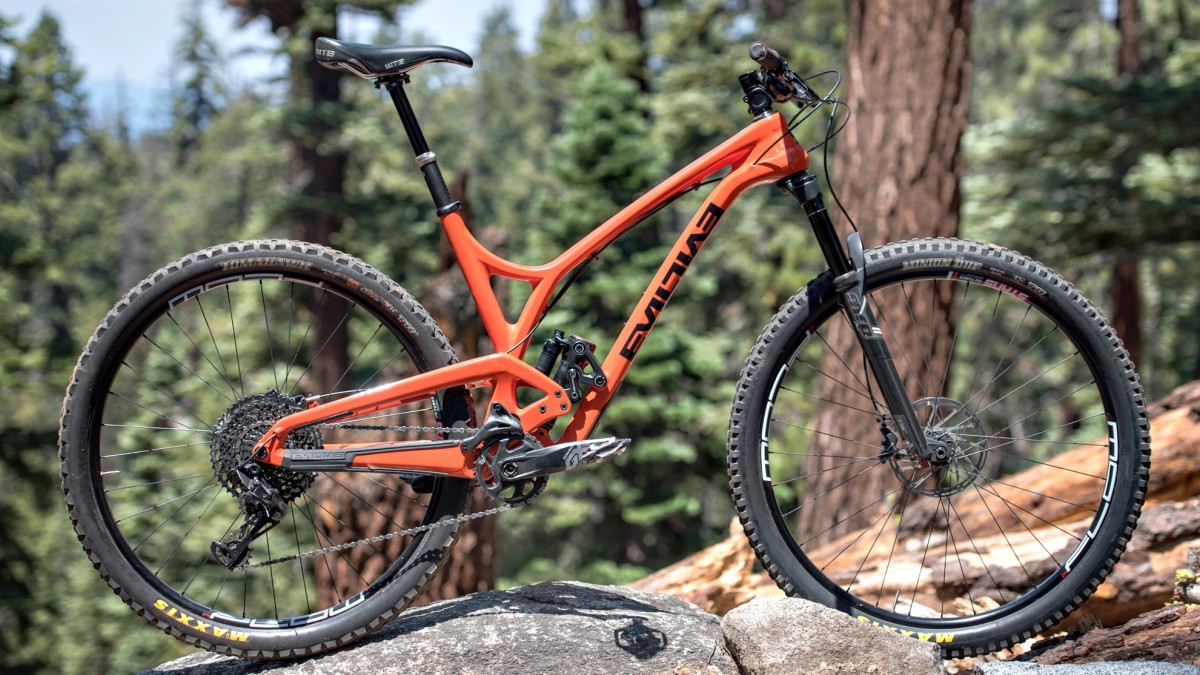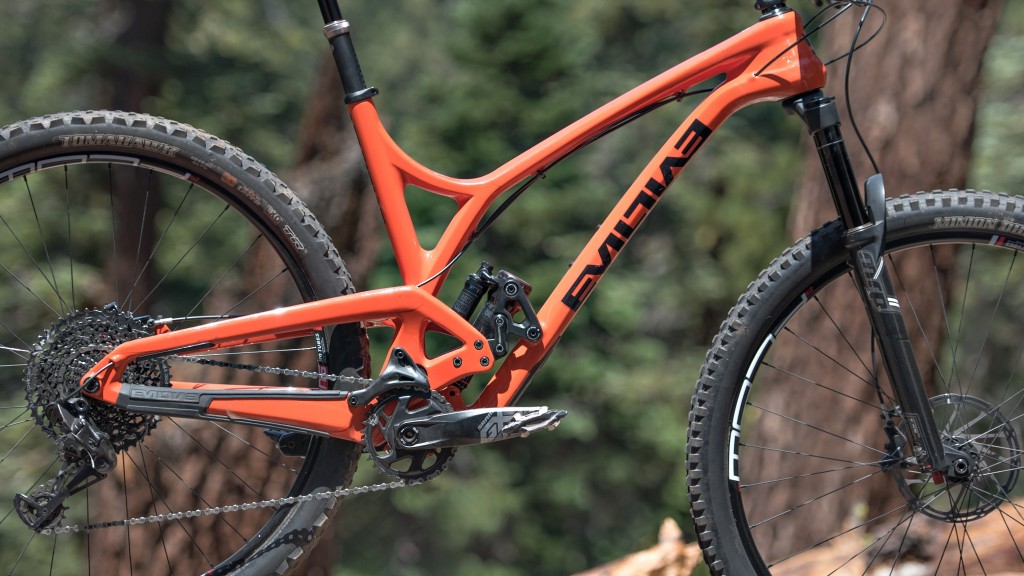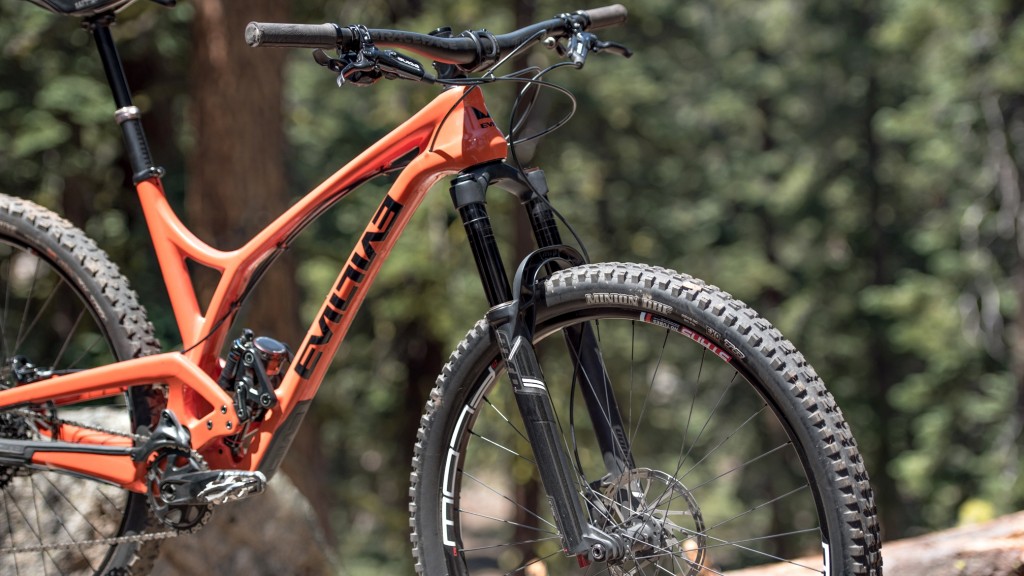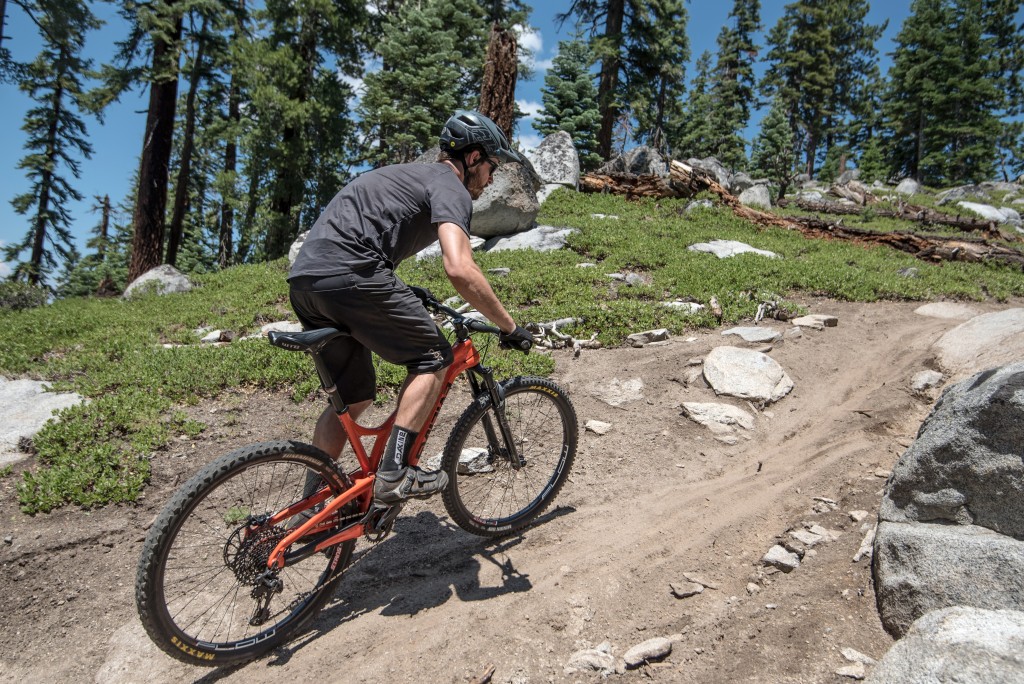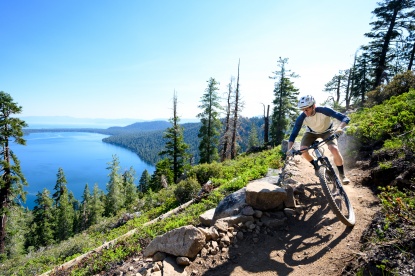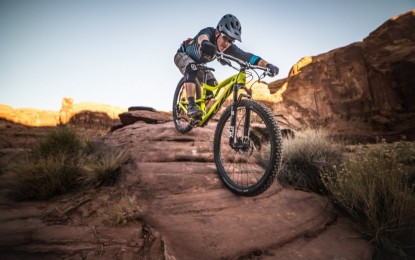Evil Following MB 2018 Review
Our Verdict
Our Analysis and Test Results
The Following has been completely redesigned for 2020. The new version has an updated frame and geometry and we expect its performance to be different from the model we tested.
Should I Buy This Bike?
Evil describes the Following as "big bike fun in a shorter travel package''. We find this assessment to be somewhat accurate but possibly a little deceiving. This stout, short-travel, shredder is very fun on flowy, high-speed trials. On most trails, the Following is as fun as a barrel of monkeys. That said, we had far less “big bike fun” when riding sustained rock gardens or chunky, physical, trails. This 120mm bicycle has the ability to beat you up on nasty terrain. It can ride everything, but it can be a rough ride on demanding trails. The Following is a great option for those who live in an area with a lot of berm-infested, smoother, trails. Riders who find themselves riding large doses of rocks and roots should look elsewhere. Yes, the following statement is a luxury, but this Evil would make a spectacular second bike for the rider who already has a long-travel sled.
If the Evil's price tag is too high, the Commencal Meta TR is a very fun, 130mm, 27.5-inch bike at an excellent price point. The Commencal offers sharp handling and playful manners while boasting similar capabilities in terms of climbing and descending. This shredder is available in aluminum only with build kits starting at $2299.
Frame Design
The Following MB uses Evil's DELTA suspension system. While it appears complicated, it is simply a linkage-driven single pivot design. There is a pivot forward and above the bottom bracket with an intricate linkage system that drives the shock. This bike is designed around a 130mm fork but can accept a 120mm or 140mm fork too.
Typically, we measure all of our test bikes ourselves. We rode an extra-large Following and didn't want to post our measurements because the rest of our test bikes have been medium and large frames. We felt offering measurements for a frame size that we don't regularly test would create more confusion than clarity. Here are the manufacturer measurements for a large frame.
The large Following has a 622mm effective top tube and 470mm reach. The chainstays are 430mm and the wheelbase is 1177mm. This bike has a flip-chip geometry adjustment system that changes between a cleverly named low and x-low settings.
In the low mode the Following has a 67.4-degree head tube angle and 338mm bottom bracket height.
In the x-low setting, the Following has a 66.8-degree head tube angle and a 330mm bottom bracket height.
Design Highlights
- 29-inch wheels, compatible with 27.5+
- 120mm of DELTA rear wheel travel
- Designed around 130mm fork, also compatible with 120mm and 140mm forks
- Flip-Chip geometry adjustment between low and x-low settings
- Carbon fiber only
- Frame-only $3099
- Build kits starting at $5699.
Downhill Performance
The Following offers sporty and stable downhill performance. This bike has a clear preference for railing berms, pumping rolls, and flat-out speed. Despite its 120mm of rear wheel travel, the Following stands up pretty well to minor doses of rocks or steeper gnar. That said, it is far less confident on sustained, rough, rock gardens. The geometry is spot-on and it results in a lively and very fun ride.
One glance at the Following's suspension design and it is easy to see the weight tucked low in the frame. The DELTA suspension linkage and the RockShox Super Deluxe shock are just north of the bottom bracket. Having a lower center of gravity results in a planted and stable feel. As the speedometer rises, that added stability starts to pay dividends. This bike remains very composed even at borderline uncomfortable speeds. The Following's geometry is relaxed, but not quite extreme. The 67.4/66.8 head tube angle is in-line with many short-travel bikes. The 338/330mm bottom bracket height is a bit more extreme. It is the blend of the low center of gravity and the semi-slack/low geometry that provides spectacular stability. Tearing down fast and flowy trails is confident and very, very fun.
Handling is impressive aboard this short-travel 29er. Make no mistake, other bikes in this travel range like the Pivot Trail 429 or Specialized Stumpjumper ST offer quicker handling at slow to moderate speeds. Both bikes are more efficient climbers, but neither can hold a candle to the Evil's performance at mach speeds. Even when you are riding at an uncomfortable pace, the Following responds to rider input and obeys orders. The Stumpjumper ST and Trail 429 get sketchy when they are being driven that hard.
Performance on rocks and roots can be described as sporty and tight-handling. It may be a statement of the obvious, but this 120mm travel bicycle isn't designed for charging burly rock gardens or rutted/rooty trails. The Following can ride some rowdy terrain, but it prefers not to. The result is a jarring ride that can be difficult to muscle to hold it on a line. If you're entering a nasty section of trail, point the bike in the right direction and hold on tight because it will be a rough ride. It is best to rely on sharp and quick handling to sneak down smooth and well-planned lines. Being smart about line selection goes a very long way with the Following. Other bikes like the Transition Smuggler or Santa Cruz Hightower react much better in this situation.
We rode this bike in the low and the x-low geometry setting. If you frequently ride rooty and rocky trails, we highly recommend the low setting. This will buy you a surprisingly valuable 8mm of extra clearance. The x-low setting is stable and very aggressive, but the risk of a disastrous pedal strike is higher.
Climbing Performance
The Evil Following is an impressive climber. Given its obvious desire for high-speed, berm-infested, downhills, it scoots uphill effectively. The Following is relatively efficient and offers decent handling. This bicycle does require a bit of attention when cranking up technical climbs. The second you zone out, it is very easy to experience a bone-rattling pedal strike.
The Evil sets you up in a reasonable climbing position. The 74.3-degree seat tube angle is on the slacker side of things. Your hips are slightly behind the bottom bracket, but it is by no means crippling. The lengthy reach/top tube measurement pulls the rider weight forward and seems to partially counteract the slack seat tube angle. This bike offers a comfortable cockpit position and riders shouldn't be afraid of long ascents on this bike.
The DELTA suspension offers a surprisingly nice pedal platform. This linkage-driven single pivot design is impressively firm under standing or seated pedaling loads. Testers had anticipated a far less composed climbing experience. The bike settles into a nice, high, sag point on the Super Deluxe shock and the sagged geometry remains stellar. We recommend leaving the shock in the open position and saving the climb switch for road or double track climbs.
The Following offers okay climbing traction. Designing a full-suspension mountain bike is a game of tradeoffs. A firmer pedal platform offers less active suspension that is more efficient but has less rear wheel traction. More active suspension means less pedaling support but improved traction. With the Evil you are gaining a firm feel under pedaling loads but you sacrifice suspension movement and climbing traction. Scurrying up rock and root-infested trails can lead the rear wheel bouncing around and spinning. Running 2.5 or 2.6-inch tires would definitely improve traction compared to the stock 2.35-inch rubber.
Uphill handling is respectable. The Following can change lines relatively quickly. Navigating technical terrain is easy except for one major asterisk. Clearance and pedal strikes are problematic. If you climb rooty and rocky terrain, we highly recommend riding this bike in the low geometry setting as opposed to x-low. The 8mm difference in bottom bracket height seems marginal, but it is substantial. Carefully planned out pedal strokes and perfecting your ratchet stroke is very important. If you end up running carbon cranks, it might be a good idea to double down on crank boots. Some folks opt to build this frame with a 120mm fork, that drops the bottom bracket height to an even lower 335/327mm. Riders who ride buff, sinuous climbs or grind up a lot of fire roads won't need to worry as much about the pedal strike problem.
Value
The Evil Following MB sells for $3099 as a frame with well-equipped build kits starting at $5799. This is a hefty price tag for a linkage driven single pivot. On-trail performance is solid and reliable but lacks the wow factor. Make no mistake, this could still be a fantastic bike for the right rider on the right trails, but we would still call this bike a below-average value.
Conclusion
The Evil Following MB is a short-travel 29er that is a blast when its in its element. Charging down flow trails, railing berms, and pumping rolls in the trail is very fun. Given its appetite for high-speed downhills, the Evil is still a solid climber. Riders who ride slower, technical or rough trails should consider other bikes. Yes, this bike punches above its weight class, but not drastically, it is still a 120mm bike. The Following is a great example of a bike that rides very well in its intended application.


